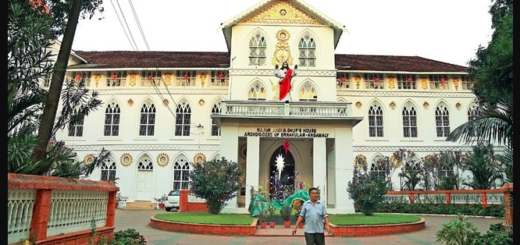Catching them young to prevent Christian northeast happening

Source: Matters India
Ballabhgarh: More than 100 children from the northeastern Indian states are living in two hostels managed by Vanvasi Kalyan Ashramm (VKA).in a Haryana town
The hostels, Donyi-Polo Chhatravas and Shaheed Jadonang Hostel, are set up to prevent northeastern India from becoming totally Christian and secessionist, their caretakers claim.
“They won’t be a part of this country if they become Christians. Christians are working to achieve that,” says Prashant Singh, caretaker of Shaheed Jadonang Hostel.
He says that would happen if everyone stays in the northeast. “A state like Mizoram which now has 99 percent Christians will reach 100 percent. The entire northeast will be cut from the country,” he explains.
Singh, originally from Gorakhpur in Uttar Pradesh, shifted to Narela on the Delhi-Haryana border when the hostel was set up in 2011.
He claims the facilities they provide are not available in northeast, even in Guwahati, the major hub of the region. “Our goal is not to keep them here forever, but to expand our work in the northeast, we want them to go back and propagate our work further.”
According to him, all arrangements at the hostel are made by the kids, including providing medical aid and cooking food. They follow a strict discipline of daily activities assigned by the caretaker. The day starts at 4:30 am and lasts until 10 pm.
The kids are allowed to go to their homes only once in two years.
“The kids who are brought by our karyakartas from the remote areas of the northeast are handed over to us at Guwahati from where we bring them here on a train. These children stay here for free and study at a school nearby called Bharat Mata Public school, also for free,” says
All that is fine, but finding these hostels in the narrow, crowded streets of Tirkha colony in Ballabhgarh in Haryana’s Faridabad district is tough. Local people have not heard of any place where students from any northeastern states. But ask them for ‘Nepali or Chinese kids’ living in the area and they would point to one of the buildings. The board outside the two-storey building reads, “Donyi Polo Chhatrawas, run by the Vanvasi Kalyan Ashram.”
The hostel, like many other buildings in the area, was built on a small plot. Its dark, hot and humid rooms are named after revered personalities found in textbooks prepared by the Hindutva groups. Each room houses three or four students who have come from the rural belts of Haflong, Karimganj (in Assam), Rajivnagar (in Mizoram), and Tamenglong (Manipur).
The hostels are for students who had finished their tenth standard. Some hostellers studies in nearby schools while the older ones went to a local private college.
Some hostellers told a Hindustan Times reporter that life in hostels is not that pleasant, not just because of their strictness, but the attitude of local people. “It’s not just the food, language or the climate that is challenging but also the attitude of the locals,” says Mongol Halam, a student from the Karimganj district of Assam that borders Bangladesh.
He said the biggest problem they face is the racist remarks from the local peope. “When people see that our features are different they assume that we are Nepalis. Some have even asked us if Assam comes under Nepal,” the young boy explained.
All the students come from poor families with limited access to education in their region. The situation is so grim it leaves them with no option but to trust a stranger, a karyakarta, to embark on a journey to the national capital city.
Halam said he came to Delhi with 11 others. “We were brought from Guwahati to Delhi by a karyakarta. I was the only one for this hostel in that group, the rest went to a hostel in Narela,” he said.
According to the kids in the hostel, these ashram karyakartas have networks everywhere which help them establish contacts with parents and convince them to send their kids for better education. The students are then sent to hostels in different parts of the country. A small amount is taken from the parents as travel and living expenses.
The children in the Haryana came from different tribes of the region. They narrate how the Christians have converted many tribals to Christianity and that this was the reason they were sent to the hostel. Asked if they are not animist the children say that most of them are Hindus, locally interpreted as Buddhism, Heraka or other animistic practices.
The Shaheed Jadonang hostel in Narela, named after Haipou Jadonang, a Rongmei Naga spiritual leader from Manipur who established the Heraka religious movement and had also envisioned an independent Naga kingdom. Jadonang was hanged by the British in 1931.
As many as 41 children between the ages of 12 to 16 live at the hostel. Everyone in the locality assumes the children in the ‘ashram’ are ‘Nepalis’. The children mostly keep to the hostel premises and only leave to go to school or for Shakha activities held in a nearby playground.
The only child at the hostel who was allowed to talk to reporters was Hamanso Valang. Valang, a Mishmi tribal, has been living at the Jadonang hostel for the past six years and has visited home twice. He would like to get into politics after his studies.
Singh interrupts to say that Valang is a fan of Modi and would like to become a leader like him. “There is no development in our region. There are no good schools around. No teacher or government official can change that, only a political leader can bring in some change,” says Valang.
















